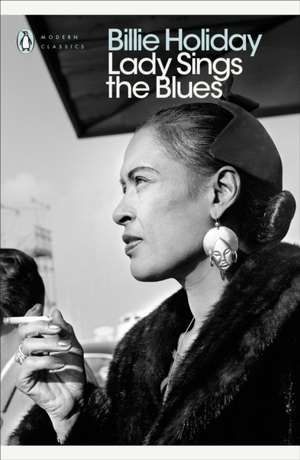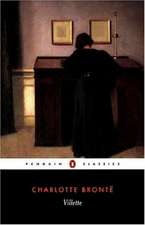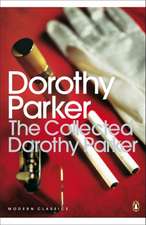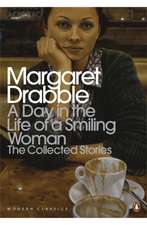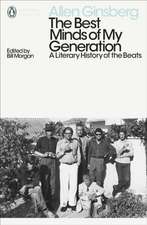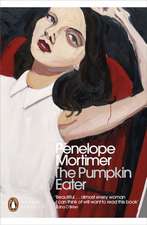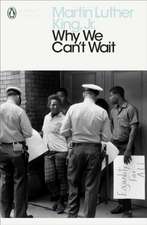Lady Sings the Blues: Penguin Modern Classics
Autor Billie Holidayen Limba Engleză Paperback – 28 noi 2018
"I've been told that no one sings the word 'hunger' like I do. Or the word 'love'."
Lady Sings the Bluesis the inimitable autobiography of one of the greatest icons of the twentieth century. Born to a single mother in 1915 Baltimore, Billie Holiday had her first run-in with the law at aged 13. But Billie Holiday is no victim. Her memoir tells the story of her life spent in jazz, smoky Harlem clubs and packed-out concert halls, her love affairs, her wildly creative friends, her struggles with addiction and her adventures in love. Billie Holiday is a wise and aphoristic guide to the story of her unforgettable life.
| Toate formatele și edițiile | Preț | Express |
|---|---|---|
| Paperback (2) | 51.82 lei 22-33 zile | +16.80 lei 6-12 zile |
| Penguin Books – 28 noi 2018 | 51.82 lei 22-33 zile | +16.80 lei 6-12 zile |
| Harlem Moon – 31 mai 2006 | 97.57 lei 3-5 săpt. |
Din seria Penguin Modern Classics
- 17%
 Preț: 41.41 lei
Preț: 41.41 lei -
 Preț: 82.90 lei
Preț: 82.90 lei -
 Preț: 80.98 lei
Preț: 80.98 lei - 15%
 Preț: 48.87 lei
Preț: 48.87 lei - 17%
 Preț: 52.07 lei
Preț: 52.07 lei - 19%
 Preț: 59.39 lei
Preț: 59.39 lei - 18%
 Preț: 46.05 lei
Preț: 46.05 lei - 17%
 Preț: 52.49 lei
Preț: 52.49 lei -
 Preț: 69.06 lei
Preț: 69.06 lei - 16%
 Preț: 58.66 lei
Preț: 58.66 lei - 17%
 Preț: 51.67 lei
Preț: 51.67 lei -
 Preț: 81.84 lei
Preț: 81.84 lei - 18%
 Preț: 46.25 lei
Preț: 46.25 lei -
 Preț: 97.20 lei
Preț: 97.20 lei - 17%
 Preț: 52.33 lei
Preț: 52.33 lei - 15%
 Preț: 48.90 lei
Preț: 48.90 lei - 16%
 Preț: 53.55 lei
Preț: 53.55 lei - 18%
 Preț: 51.39 lei
Preț: 51.39 lei -
 Preț: 63.28 lei
Preț: 63.28 lei - 16%
 Preț: 53.93 lei
Preț: 53.93 lei - 18%
 Preț: 51.00 lei
Preț: 51.00 lei - 15%
 Preț: 49.40 lei
Preț: 49.40 lei - 18%
 Preț: 50.73 lei
Preț: 50.73 lei - 16%
 Preț: 48.30 lei
Preț: 48.30 lei - 17%
 Preț: 52.10 lei
Preț: 52.10 lei -
 Preț: 81.61 lei
Preț: 81.61 lei - 17%
 Preț: 68.06 lei
Preț: 68.06 lei - 18%
 Preț: 46.25 lei
Preț: 46.25 lei - 18%
 Preț: 46.02 lei
Preț: 46.02 lei - 16%
 Preț: 42.26 lei
Preț: 42.26 lei - 17%
 Preț: 51.66 lei
Preț: 51.66 lei - 16%
 Preț: 48.24 lei
Preț: 48.24 lei - 16%
 Preț: 42.69 lei
Preț: 42.69 lei - 15%
 Preț: 54.63 lei
Preț: 54.63 lei - 18%
 Preț: 46.31 lei
Preț: 46.31 lei - 18%
 Preț: 46.31 lei
Preț: 46.31 lei - 16%
 Preț: 53.59 lei
Preț: 53.59 lei - 16%
 Preț: 53.11 lei
Preț: 53.11 lei -
 Preț: 95.04 lei
Preț: 95.04 lei - 16%
 Preț: 79.93 lei
Preț: 79.93 lei - 18%
 Preț: 46.02 lei
Preț: 46.02 lei - 15%
 Preț: 55.26 lei
Preț: 55.26 lei - 17%
 Preț: 51.60 lei
Preț: 51.60 lei - 16%
 Preț: 53.36 lei
Preț: 53.36 lei - 16%
 Preț: 53.36 lei
Preț: 53.36 lei - 18%
 Preț: 51.38 lei
Preț: 51.38 lei - 16%
 Preț: 68.94 lei
Preț: 68.94 lei - 16%
 Preț: 48.46 lei
Preț: 48.46 lei - 16%
 Preț: 53.37 lei
Preț: 53.37 lei - 17%
 Preț: 52.33 lei
Preț: 52.33 lei
Preț: 51.82 lei
Preț vechi: 62.65 lei
-17% Nou
9.92€ • 10.32$ • 8.31£
Carte disponibilă
Livrare economică 21 februarie-04 martie
Livrare express 05-11 februarie pentru 26.79 lei
Specificații
ISBN-10: 0241351294
Pagini: 192
Dimensiuni: 129 x 198 x 11 mm
Greutate: 0.15 kg
Editura: Penguin Books
Colecția Penguin Classics
Seria Penguin Modern Classics
Locul publicării:London, United Kingdom
Notă biografică
Billie Holiday was born in 1915. She began singing in jazz clubs in Harlem while still a teenager, never undergoing technical training or even learning to read music. Mainstream success followed with hits like Summertime, Autumn in New York and Strange Fruit. To this day she is still considered by many to be the greatest jazz singer of all time. She died in 1959, aged 44.
Recenzii
A wrenchingly authentic account of Holiday's turbulent trajectory from abused child to jazz genius
Her troubles are long behind her now. Her genius however, shows no sign of dimming any time soon.
Descriere
'A masterpiece, as fresh and shocking as if it were written yesterday' Craig Brown
"I've been told that no one sings the word 'hunger' like I do. Or the word 'love'."
Lady Sings the Blues is the inimitable autobiography of one of the greatest icons of the twentieth century. Born to a single mother in 1915 Baltimore, Billie Holiday had her first run-in with the law at aged 13. But Billie Holiday is no victim. Her memoir tells the story of her life spent in jazz, smoky Harlem clubs and packed-out concert halls, her love affairs, her wildly creative friends, her struggles with addiction and her adventures in love. Billie Holiday is a wise and aphoristic guide to the story of her unforgettable life.
Extras
Some Other Spring
Mom and Pop were just a couple of kids when they got married. He was eighteen, she was sixteen, and I was three.
Mom was working as a maid with a white family. When they found out she was going to have a baby they just threw her out. Pop's family just about had a fit, too, when they heard about it. They were real society folks and they never heard of things like that going on in their part of East Baltimore.
But both kids were poor. And when you're poor, you grow up fast.
It's a wonder my mother didn't end up in the workhouse and me as a foundling. But Sadie Fagan loved me from the time I was just a swift kick in the ribs while she scrubbed floors. She went to the hospital and made a deal with the head woman there. She told them she'd scrub floors and wait on the other bitches laying up there to have their kids so she could pay her way and mine. And she did. Mom was thirteen that Wednesday, April 7, 1915, in Baltimore when I was born.
By the time she worked her way out of hock in the hospital and took me home to her folks, I was so big and smart I could sit up in a carriage. Pop was doing what all the boys did then--peddling papers, running errands, going to school. One day he came along by my carriage, picked me up and started playing with me. His mother saw him and came hollering. She dragged at him and said, "Clarence, stop playing with that baby. Everybody is going to think it's yours."
"But, Mother, it is mine," he'd tell her. When he talked back to his mother like this she would really have a fit. He was still only fifteen and in short pants. He wanted to be a musician and used to take lessons on the trumpet. It was almost three years before he got long pants for the wedding.
After they were married awhile we moved into a little old house on Durham Street in Baltimore. Mom had worked as a maid up North in New York and Philly. She'd seen all the rich people with their gas and electric lights and she decided she had to have them too. So she saved her wages for the day. And when we moved in we were the first family in the neighborhood to have gas and electricity.
It made the neighbors mad, Mom putting in the gas. They said putting pipes in the ground would bring the rats out. It was true. Baltimore is famous for rats.
Pop always wanted to blow the trumpet but he never got the chance. Before we got one to blow, the Army grabbed him and shipped him overseas. It was just his luck to be one of the ones to get it from poison gas over there. It ruined his lungs. I suppose if he'd played piano he'd probably have got shot in the hand.
Getting gassed was the end of his hopes for the trumpet but the beginning of a successful career on the guitar. He started to learn it when he was in Paris. And it was a good thing he did. Because it kept him from going to pieces when he got back to Baltimore. He just had to be a musician. He worked like hell when he got back and eventually got a job with McKinney's Cotton Pickers. But when he went on the road with that band it was the beginning of the end of our life as a family. Baltimore got to be just another one-night stand.
While Pop was overseas in the war, Mom had worked in a factory making Army overalls and uniforms. When Pop hit the road, the war jobs were finished and Mom figured she could do better going off up North as a maid. She had to leave me with my grandparents, who lived in a poor little old house with my cousin Ida, her two small children, Henry and Elsie, and my great-grandmother.
All of us were crowded in that little house like fishes. I had to sleep in the same bed with Henry and Elsie, and Henry used to wet it every night. It made me mad and sometimes I'd get up and sit in a chair until morning. Then my cousin Ida would come in in the morning, see the bed, accuse me of wetting it, and start beating me. When she was upset she'd beat me something awful. Not with a strap, not with a spank on the ass, but with her fists or a whip.
She just didn't understand me. Other kids, when they did something wrong, would lie their way out of it. But if I did anything wrong I'd come right out and admit it. And she'd have a fit, call me a sinner and tell me I'd never amount to anything. She never got through telling my mother I was going to bring home a baby and disgrace the damn family like she did. One time she heard me say "Damn it" and she thought this was so sinful she tossed a pot of hot starch at me. She missed, though, because I ducked.
She was always finding fault with whatever I did, but she never did pick up on Henry. He was her son and he could do no wrong. When I got tired of getting beaten because he wet the bed I got Elsie one night and convinced her we should both sleep on the floor. She was scared. It was cold and she thought we might freeze.
"All right," I told her, "so we might freeze. But if we ain't frozen to death in the morning, the bed'll be wet and we won't be in it."
It was and we weren't, so this time Cousin Ida beat me for being smart with her. "Henry's weak," she said.
You couldn't tell her nothing about Henry, why that boy used to give us girls a terrible time. He even tried to do what we called "that thing" to us while we were sleeping. Sometimes we would be so tired from fighting this little angel off all night, we wouldn't wake up in time for school. I used to try to plead with him because I knew it wouldn't do any good to talk to Cousin Ida.
"Henry," I'd say to him, "it ain't so bad with me. I'm only your cousin. But Elsie's your sister, and besides, she's sick."
Henry grew up to be a prize fighter and then a minister. But when he was little I had hell with that boy.
One day we were playing baseball and afterwards I was sitting on the curb. I was scared of the tiniest bugs, anything that crawled, and Henry knew it. This day he came up to me holding one of Baltimore's biggest goddamn rats by the tail, swinging it in my face.
"Don't do that, Henry," I begged him.
"What's the matter, you scared?" he said, grinning and swinging it closer and closer to me.
"All girls is scared of rats and bugs," I said.
He kept right on swinging. Finally he hit me in the face with the rat. I took a baseball bat and put him in the Johns Hopkins Hospital.
I don't think my grandma ever understood me either, but she never beat me like Cousin Ida did, and that was something. My grandpop loved me, though. He was half Irish and named after his father, Charles Fagan, who was straight from Ireland.
The one I really liked best, though, was my great-grandmother, my grandfather's mother.
She really loved me and I was crazy about her. She had been a slave on a big plantation in Virginia and she used to tell me about it. She had her own little house in the back of the plantation. Mr. Charles Fagan, the handsome Irish plantation owner, had his white wife and children in the big house. And he had my great-grandmother out in back. She had sixteen children by him, and all of them were dead by then except Grandpop.
We used to talk about life. And she used to tell me how it felt to be a slave, to be owned body and soul by a white man who was the father of her children. She couldn't read or write, but she knew the Bible by heart from beginning to end and she was always ready to tell me a story from the Scriptures.
She was ninety-six or ninety-seven then and had dropsy. I used to take care of her every day after school. No one else paid any attention. I'd give her a bath sometimes. And I'd always bind her legs with fresh cloths and wash the smelly old ones.
She'd been sleeping in chairs for ten years. The doctor had told her she'd die if ever she laid down. But I didn't know. And once after I'd changed the cloths on her legs and she had told me a story, she begged me to let her lie down. She said she was tired. I didn't want to let her. But she kept begging and begging. It was pitiful.
Finally I spread a blanket on the floor and helped her stretch out. Then she asked me to lie down with her because she wanted to tell me another story. I was tired too. I'd been up early that morning to scrub steps. So I laid down with her. I don't remember the story she told me because I fell asleep right away.
I woke up four or five hours later. Grandma's arm was still tight around my neck and I couldn't move it. I tried and tried and then I got scared. She was dead, and I began to scream. The neighbors came running. They had to break Grandma's arm to get me loose. Then they took me to a hospital. I was there for a month. Suffering from what they said was shock.
When I got home Cousin Ida started right in where she had left off, beating me. This time it was for letting Grandma out of her chair. The doctor tried to stop her. He said if she kept it up I'd grow up to be nervous. But she never stopped.
I was a woman when I was sixteen. I was big for my age, with big breasts, big bones, a big fat healthy broad, that's all. So I started working out then, before school and after, minding babies, running errands, and scrubbing those damn white steps all over Baltimore.
When families in the neighborhood used to pay me a nickel for scrubbing them down, I decided I had to have more money, so I figured out a way. I bought me a brush of my own, a bucket, some rags, some Octagon soap, and a big white bar of that stuff I can't ever forget--Bon Ami.
The first time I stood on a white doorstep and asked this woman for fifteen cents for the job, she like to had a fit. But I explained to her the higher price came from me bringing my own supplies. She thought I had a damn nerve, I guess, but while she was thinking it over I said I'd scrub the kitchen or bathroom floor for the same price. That did it. I had the job.
All these bitches were lazy. I knew it and that's where I had them. They didn't care how filthy their damn houses were inside, as long as those white steps were clean. Sometimes I'd bring home as much as ninety cents a day. I even made as high as $2.10--that's fourteen kitchen or bathroom floors and as many sets of steps.
When I went into the scrubbing business it was the end of roller skating, bike riding, and boxing, too. I used to like boxing. In school they used to teach us girls to box. But I didn't keep it up. Once a girl hit me on the nose and it just about finished me. I took my gloves off and beat the pants off her. The gym teacher got so sore, I never went near the school gym again.
But whether I was riding a bike or scrubbing somebody's dirty bathroom floor, I used to love to sing all the time. I liked music. If there was a place where I could go and hear it, I went.
Alice Dean used to keep a whorehouse on the corner nearest our place, and I used to run errands for her and the girls. I was very commercial in those days. I'd never go to the store for anybody for less than a nickel or a dime. But I'd run all over for Alice and the girls, and I'd wash basins, put out the Lifebuoy soap and towels. When it came time to pay me, I used to tell her she could keep the money if she'd let me come up in her front parlor and listen to Louis Armstrong and Bessie Smith on her victrola.
A victrola was a big deal in those days, and there weren't any parlors around that had one except Alice's. I spent many a wonderful hour there listening to Pops and Bessie. I remember Pops' recording of "West End Blues" and how it used to gas me. It was the first time I ever heard anybody sing without using any words. I didn't know he was singing whatever came into his head when he forgot the lyrics. Ba-ba-ba-ba-ba-ba-ba and the rest of it had plenty of meaning for me--just as much meaning as some of the other words that I didn't always understand. But the meaning used to change, depending on how I felt. Sometimes the record would make me so sad I'd cry up a storm. Other times the same damn record would make me so happy I'd forget about how much hard-earned money the session in the parlor was costing me.
But Mom didn't favor her daughter hanging around the house on the corner. And especially she couldn't understand why I wasn't bringing home any loot. "I know Eleanora," she used to complain, Eleanora being the name I'd been baptized under, "and she don't work for nobody for nothing." When Mom found out I was using my hard-earned money paying rent on Alice's parlor to listen to jazz on the victrola, she nearly had a fit too.
I guess I'm not the only one who heard their first good jazz in a whorehouse. But I never tried to make anything of it. If I'd heard Louis and Bessie at a Girl Scout jamboree, I'd have loved it just the same. But a lot of white people first heard jazz in places like Alice Dean's, and they helped label jazz "whorehouse music."
